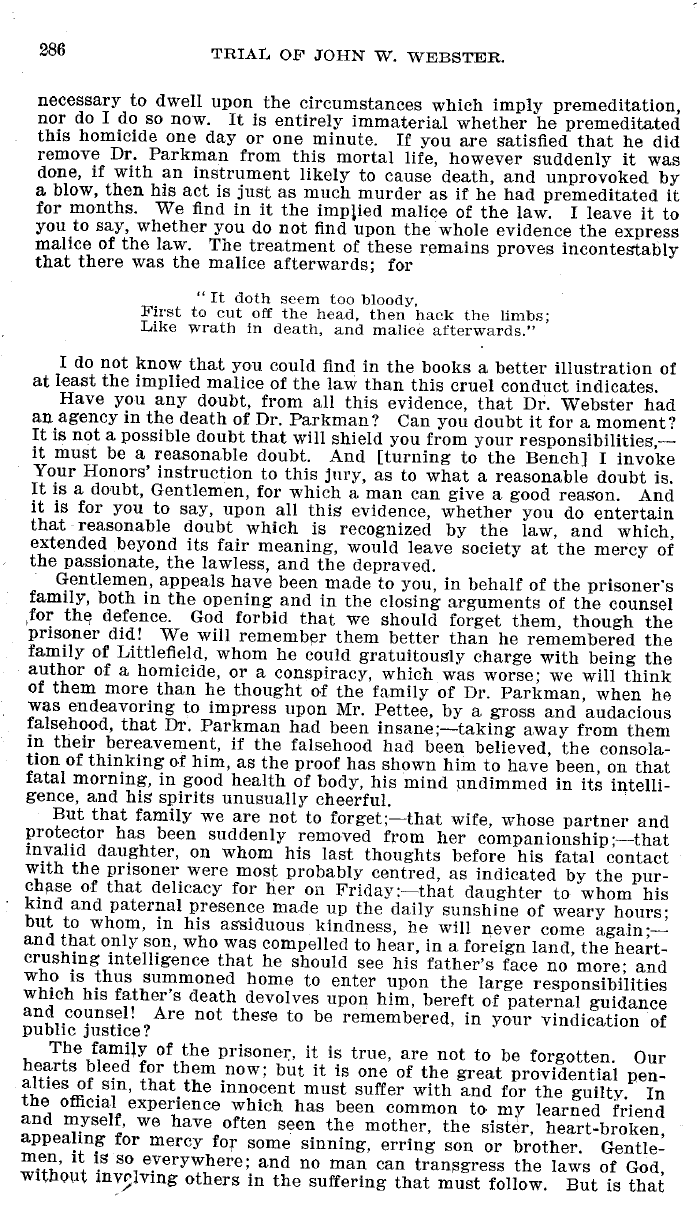|
286 TRIAL OF JOHN W. WEBSTER.
necessary to dwell upon the circumstances which imply premeditation,
nor do I do so now. It is entirely immaterial whether he premeditated
this homicide one day or one minute. If you are satisfied that he did
remove Dr. Parkman from this mortal life, however suddenly it was
done, if with an instrument likely to cause death, and unprovoked by
a blow, then his act is just as much murder as if he had premeditated it
for months. We find in it the implied malice of the law. I leave it to
you to say, whether you do not find upon the whole evidence the express
malice of the law. The treatment of these remains proves incontestably
that there was the malice afterwards; for
" It doth seem too bloody,
First to cut off the head, then hack the limbs;
Like wrath in death, and malice afterwards."
I do not know that you could find in the books a better illustration of
at least the implied malice of the law than this cruel conduct indicates.
Have you any doubt, from all this evidence, that Dr. Webster had
an agency in the death of Dr. Parkman? Can you doubt it for a moment?
It is not a possible doubt that will shield you from your responsibilities,-
it must be a reasonable doubt. And [turning to the Bench] I invoke
Your Honors' instruction to this jury, as to what a reasonable doubt is.
It is a doubt, Gentlemen, for which a man can give a good reason. And
it is for you to say, upon all this evidence, whether you do entertain
that reasonable doubt which is recognized by the law, and which,
extended beyond its fair meaning, would leave society at the mercy of
the passionate, the lawless, and the depraved.
Gentlemen, appeals have been made to you, in behalf of the prisoner's
family, both in the opening and in the closing arguments of the counsel
for the defence. God forbid that we should forget them, though the
prisoner did! We will remember them better than he remembered the
family of Littlefield, whom he could gratuitously charge with being the
author of a homicide, or a conspiracy, which was worse; we will think
of them more than he thought of the family of Dr. Parkman, when he
was endeavoring to impress upon Mr. Pettee, by a gross and audacious
falsehood that Dr. Parkman had been insane; taking away from them
in their bereavement, if the falsehood had been believed, the consola-
tion of thinking of him, as the proof has shown him to have been, on that
fatal morning, in good health of body, his mind undimmed in its intelli-
gence, and his spirits unusually cheerful.
But that family we are not to forget;-that wife, whose partner and
protector has been suddenly removed from her companionship; that
invalid daughter, on whom his last thoughts before his fatal contact
with the prisoner were most probably centred, as indicated by the pur-
chase of that delicacy for her on Friday:-that daughter to whom his
kind and paternal presence made up the daily sunshine of weary hours;
but to whom, in his assiduous kindness, he will never come again;
and that only son, who was compelled to hear, in a foreign land, the heart-
crushing intelligence that he should see his father's face no more; and
who is thus summoned home to enter upon the large responsibilities
which his father's death devolves upon him, bereft of paternal guidance
and counsel! Are not these to be remembered, in your vindication of
public justice?
The family of the prisoner, it is true, are not to be forgotten. Our
hearts bleed for them now; but it is one of the great providential pen-
alties of sin, that the innocent must suffer with and for the guilty. In
the official experience which has been common to my learned friend
and myself, we have often seen the mother, the sister, heart-broken,
appealing for mercy for some sinning, erring son or brother. Gentle-
men, it is so everywhere; and no man can transgress the laws of God,
without involving others in the suffering that must follow. But is that
|

